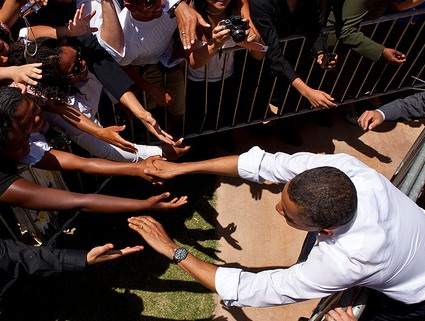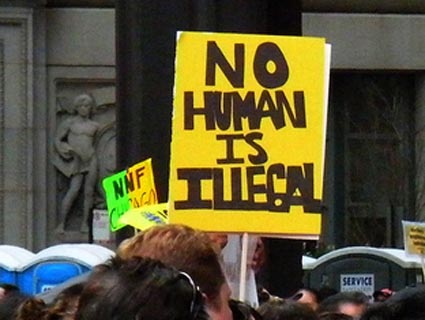
President Barack Obama following remarks on immigration reform in 2011Flickr/White House
Speaking to an audience in Las Vegas, President Barack Obama made his case for immigration reform Tuesday, invoking the idea of America as a nation of immigrants and saying he believed Republicans were truly committed to getting reform done.
“It’s easy for the discussion to take on a feeling of ‘us’ versus ‘them,'” Obama said. “A lot of folks forget that most of ‘us’ used to be ‘them.'”
Obama’s proposal resembles, to a large degree, the one put forth by the bipartisan Senate “Gang of Eight” Monday. It proposes adding more resources for immigration enforcement and border security, a mandatory employment verification system, and a path to citizenship—what critics will call “amnesty,” but that the White House has referred to as “earned citizenship.” Like the Senate bill, undocumented immigrants on temporary legal status while they are “going to the back of the line” to apply for citizenship would not be eligible for federal benefits.
On these broad principles, the Senate and the White House are in agreement; but, of course, the details matter, and there are key differences:
- No security requirement for the path to citizenship: While the Senate plan describes border security requirements that may have to be met before undocumented immigrants already in the US can complete the legalization process, the White House plan has no such requirement. The dispute over what, if any, border security requirements must be met could endanger the passage of any bill. (To be eligible for legal status or citizenship under both plans, undocumented immigrants still have to pay fines and pass background checks).
- Nothing resembling a guest worker program: While the Senate proposal calls for a “humane and effective system” for “immigrant workers to enter the country and find employment without seeking the aid of human traffickers or drug cartels,” the White House fact sheet provided to reporters does not address this issue. That’s a problem, because some kind of system for foreign workers is necessary to deter illegal immigration in the future.
- Families headed by same-sex couples are treated as other families: The White House’s proposal “treats same-sex families as families by giving U.S. citizens and lawful permanent residents the ability to seek a visa on the basis of a permanent relationship with a same-sex partner.” Republicans on the Gang of Eight have treated this issue as unimportant. Sen. John McCain (R-Ariz.) said same-sex couples are “not of paramount importance,” while Sen. Lindsey Graham (R-S.C.) asked sarcastically, “Why don’t we just put legalized abortion in there and round it all out?”
- DREAMers get an expedited citizenship process, but agricultural workers do not: The Senate proposal exempted not just DREAM Act undocumented immigrants, who were brought here as children and are poised to go to college or join the military, but agricultural workers “because of the role they play in ensuring that Americans have safe and secure agricultural products to sell and consume.” The White House plan only expedites “earned citizenship” for DREAM Act-eligible undocumented immigrants, presumably because they’re slightly less fond of Big Ag than the upper chamber of Congress.
The two variables that are likeliest to cause friction between the White House and Congress are security requirements on the path to citizenship and the length of the path to citizenship itself. This afternoon on the Senate floor, Sen. Marco Rubio (R-Fla.), one of the Republican members of the “Gang of Eight,” warned Obama: “If this endeavor becomes a bidding war to see who can come up with the easiest, quickest, and cheapest pathway to a green card possible, this thing is not going to go well.” The clear implication is that despite bipartisan agreement on a path to citizenship, Rubio—and by extension, other Republicans currently supporting a reform push—could easily withdraw their support, based on how that path is paved.
Obama made it clear that if the Senate bill fails, he won’t simply be giving up. “If Congress is unable to move forward in a timely fashion,” Obama said. “I will send up a bill based on my proposal and insist that they vote on it right away.”
Here’s the speech:








